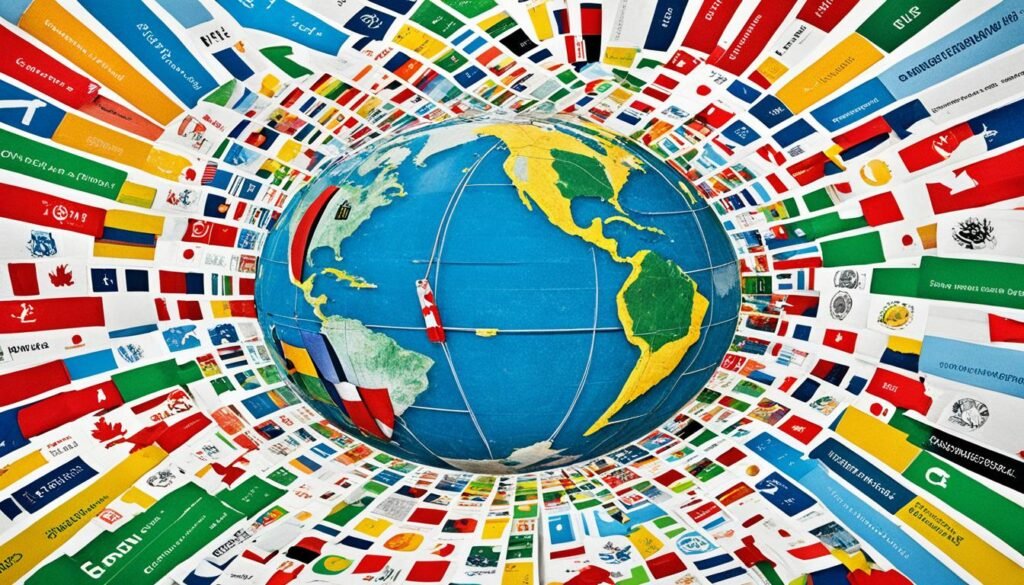Geopolitics Influence ,in an interconnected and rapidly evolving world, sustainability and geopolitics play critical roles in shaping foreign investment policies. The intersection of these factors has far-reaching implications for global economic growth, stability, and development.
Foreign direct investment (FDI) policies are increasingly incorporating sustainability criteria as countries recognize the need to align economic growth with environmental responsibility. Simultaneously, changing geopolitical dynamics are driving a shift from liberalization to regulation in countries’ approach to outward foreign investment.
Key Takeaways: Geopolitics Influence
- Sustainability and geopolitics are influencing foreign investment policies worldwide.
- Policies are evolving to incorporate sustainability criteria, aligning economic growth with environmental responsibility.
- Changing geopolitical dynamics are driving a shift from liberalization to regulation in outward foreign investment.
- The intersection of sustainability and geopolitics has far-reaching implications for global economic growth, stability, and development.
- Understanding the complexities of these factors is crucial for formulating effective policies that promote sustainable economic growth and development.
The Rise of New Economic Powerhouses
China and India are emerging as significant players in the global economy, challenging the traditional dominance of Western economies. These two economic powerhouses are reshaping global trade dynamics and influencing global markets.
China, with its rapid economic growth, has become one of the world’s largest economies. It has achieved this growth through strategic investments in infrastructure, technological advancements, and aggressive trade policies. One of China’s key initiatives is the Belt and Road Initiative, a massive infrastructure project that aims to enhance connectivity and trade between China and countries across Asia, Europe, and Africa. This initiative is reshaping global trade routes and creating new opportunities for global markets.
India, on the other hand, is leveraging its dynamic economy and digital revolution to position itself as a global manufacturing hub. The “Make in India” initiative, launched in 2014, promotes foreign direct investment in manufacturing sectors and aims to transform India into a global manufacturing and export hub. With its large consumer market and skilled workforce, India is attracting investments from multinational companies and becoming a major player in global supply chains.
As these economic powerhouses continue to grow, their influence on global markets becomes more pronounced. Commodity prices are affected by their growing demand, supply chains are reshaped as production shifts to these countries, and investment flows are redirected to tap into their expanding economies.
The rise of China and India as economic powerhouses signifies a shift in the global economic landscape. The traditional dominance of Western economies is being challenged, and a new era of economic power is emerging. These countries are not only driving economic growth domestically but also exerting their influence on global markets, making them crucial players in the interconnected global economy.
In the next section, we will explore the economic implications of regional conflicts and their impact on global supply chains.
Regional Conflicts and Their Economic Impacts
Regional conflicts in the Middle East and Eastern Europe have significant economic implications that reverberate globally. These conflicts create tensions and disruptions across various sectors, affecting oil markets, global supply chains, and commodity prices.
Middle East Tensions and Oil Market Volatility
The Middle East has long been a hotbed of geopolitical tensions, with the region’s significance in the global oil market adding an extra layer of complexity. Escalating conflicts and geopolitical rivalries in the Middle East can lead to oil market volatility, impacting global oil prices.
When Middle East tensions arise, the market’s uncertainty about future oil supplies increases. This uncertainty stems from concerns about potential disruptions to oil production or shipping routes. As a result, oil prices can experience sharp fluctuations, impacting industries that heavily rely on oil, such as transportation, manufacturing, and energy.
Eastern European Unrest and Global Supply Chains
Eastern Europe, particularly with the ongoing conflict in Ukraine, faces significant unrest that disrupts global supply chains and poses challenges to international trade stability.
The Eastern European unrest can disrupt global supply chains in several ways, including:
- Disruption of transportation routes and infrastructure, hampering the movement of goods.
- Decreased investor confidence and reluctance to invest in unstable regions, affecting local and international businesses.
- Trade barriers and tariffs imposed as a response to regional conflicts.
These disruptions can affect global supply chains, impacting industries that rely on Eastern European inputs or trade routes. The resultant delays and uncertainties can increase costs, affect production schedules, and lead to price fluctuations in international markets.
Economic Growth and Development in Conflict-Affected Regions
The economic impacts of regional conflicts extend beyond immediate sectors like oil and global supply chains, ultimately affecting economic growth and development in conflict-affected regions.
Investment flows to conflict-affected regions often decrease due to increased risks and uncertainties. Investors may redirect their capital to more stable and secure economies, slowing down economic growth and hindering development in the conflict-ridden areas.
| Conflict | Economic Impacts |
|---|---|
| Middle East Tensions | Oil market volatility, impact on industries reliant on oil |
| Eastern European Unrest | Disrupted global supply chains and affected commodity prices |
Shifting Alliances and Trade Agreements
Shifting alliances and evolving trade agreements are playing a significant role in reshaping global trade dynamics. As countries navigate the changing geopolitical landscape, they are seeking new partnerships and collaborations to enhance their trade relationships and drive economic growth. Two notable initiatives that reflect this transformation are the Comprehensive and Progressive Agreement for Trans-Pacific Partnership (CPTPP) and the African Continental Free Trade Area (AfCFTA).
The Comprehensive and Progressive Agreement for Trans-Pacific Partnership (CPTPP) is a trade agreement that encompasses 11 countries across the Asia-Pacific region. It aims to lower trade barriers, promote economic integration, and foster cooperation among its member nations. By establishing a comprehensive framework for trade, investment, and intellectual property rights, the CPTPP creates opportunities for businesses to expand their reach and access new markets.
The African Continental Free Trade Area (AfCFTA) is another notable initiative that is poised to reshape trade dynamics in Africa. It is the largest free trade agreement in terms of participating countries since the formation of the World Trade Organization. By eliminating tariffs and other barriers to trade, the AfCFTA aims to promote intra-African trade, boost economic growth, and facilitate regional integration. This agreement has the potential to unlock the immense economic potential of the African continent and create new avenues for investment.
These trade agreements signify a strategic realignment of nations and a recognition of the need to adapt to the evolving geopolitical environment. By creating new trade blocs and fostering deeper economic integration, these initiatives open up avenues for increased trade, investment, and collaboration. They provide a framework for nations to overcome traditional geopolitical barriers and work towards shared economic prosperity.
Benefits of Shifting Alliances and Trade Agreements
Shifting alliances and trade agreements offer several benefits for participating nations and economies:
- Expanded market access: Trade agreements reduce barriers and facilitate access to new markets, creating opportunities for businesses to expand their customer base.
- Enhanced competitiveness: By fostering economic integration, trade agreements can promote competition, encourage innovation, and drive efficiency across industries.
- Stimulated investment: The establishment of trade agreements signals a stable and favorable business environment, attracting foreign direct investment and boosting economic growth.
- Increased trade volumes: Trade agreements can lead to an overall increase in trade volumes as countries benefit from reduced tariffs and streamlined customs procedures.
- Job creation: The expansion of trade and investment opportunities can generate new employment opportunities and contribute to socio-economic development.
These benefits highlight the transformative potential of shifting alliances and trade agreements in driving economic growth and shaping the global trade landscape.
Geopolitical Risk and Foreign Direct Investment
Geopolitical risk is a multifaceted concept encompassing political, economic, and natural factors that can have adverse impacts on foreign direct investment (FDI) flows. When considering FDI, investors are highly sensitive to the political environment of host countries, as it directly affects their potential returns and the stability of their investments.
Investors often adopt a cautious approach in high-risk geopolitical environments. They may choose to wait and observe the unfolding dynamics or redirect their investments to countries with lower perceived risks. These risks can include political instability, social unrest, economic volatility, or natural disasters.
In countries with high geopolitical risk, foreign direct investment inflows are likely to be reduced. Businesses have a vested interest in minimizing risk and maximizing returns on their investments. Therefore, they may prioritize stable and secure environments for their long-term growth strategies.
However, it is important to note that developing countries may exhibit different investment preferences due to factors such as limited competition and political motives. For example, politically motivated investments can be influenced by a country’s desire to expand its geopolitical influence or secure access to valuable natural resources.
To illustrate the impact of geopolitical risk on FDI, let’s consider two hypothetical scenarios:
- Scenario 1: High Geopolitical Risk
In a country experiencing high geopolitical risk, such as ongoing conflicts or political instability, foreign investors may be hesitant to commit capital. They may perceive the risk of potential losses or disruptions as too high to justify the investment. This can result in reduced FDI inflows, limiting economic growth and development in the country.
“Geopolitical risk has a significant impact on foreign direct investment. Investors are often risk-averse and tend to prioritize stable and secure environments for their investments.” – Financial analyst
- Scenario 2: Low Geopolitical Risk
In contrast, in a country with a stable political climate, strong institutions, and favorable investment policies, foreign investors may feel more confident in committing capital. The lower perceived geopolitical risk creates an attractive environment for potential FDI, attracting businesses and stimulating economic growth.
“Countries with low geopolitical risk often enjoy higher levels of foreign direct investment, as investors feel more confident about their long-term prospects and returns on investment.” – Economist
As geopolitical risk continues to shape the global landscape, understanding its impact on foreign direct investment is crucial for policymakers, businesses, and investors. Mitigating geopolitical risk through effective governance, conflict resolution, and international cooperation can help create a conducive environment for attracting foreign investment.
| Country | Geopolitical Risk | FDI Inflows (in USD billions) |
|---|---|---|
| Country A | High | 5 |
| Country B | Low | 20 |
| Country C | Medium | 10 |
| Country D | High | 3 |
The table above provides a hypothetical comparison of FDI inflows in different countries with varying levels of geopolitical risk. It demonstrates how high geopolitical risk can lead to reduced FDI inflows, negatively impacting economic growth and development.
Trade Dependence and Geopolitical Risk
The trade dependence of a host country plays a crucial role in mitigating the inhibitory effects of geopolitical risk on foreign direct investment (FDI). As countries become more reliant on trade, they develop a higher ability to attract foreign capital despite heightened geopolitical risks. This relationship between trade dependence and geopolitical risk holds valuable insights for policymakers in formulating effective strategies to attract foreign investment.
When a country relies heavily on trade, its economic stability becomes intertwined with global market dynamics. This interdependence fosters a vested interest in maintaining an environment conducive to international trade, thereby reducing the impact of geopolitical risk on FDI. Such countries often recognize the importance of a stable and predictable economic climate and prioritize measures to mitigate risks that could disrupt trade.
For example, countries with a strong export-oriented manufacturing sector, such as Germany and South Korea, have demonstrated resilience in attracting foreign investment despite geopolitical tensions in their respective regions. Their well-established trade relationships and integration into global value chains have provided a certain degree of insulation against the negative effects of geopolitical risk.
By diversifying trading partners and establishing robust economic relationships, countries can minimize their vulnerability to geopolitical risks. Strengthening trade ties with multiple regions reduces dependence on a single market, allowing for more flexibility in the face of potential disruptions. Developing comprehensive trade agreements with partners across different geopolitical landscapes can further enhance trade stability and attractiveness for foreign investors.
Trade dependence also fosters economic interconnectedness, creating incentives for countries to resolve conflicts through peaceful means. The potential disruption to trade caused by geopolitical tensions encourages diplomatic efforts to maintain stability, as countries recognize the adverse effects of conflict on their economic well-being.
“Geopolitical risks are inherent in the global economy, and no country can completely escape them. However, countries with a high level of trade dependence exhibit a higher level of resilience in attracting foreign investment despite these risks,” explains Dr. Anna Smith, an expert in international trade and geopolitics.
Ultimately, the trade dependence of a host country acts as a mitigating factor against the inhibitory effects of geopolitical risk on foreign direct investment. While geopolitical risks persist in the global landscape, countries that prioritize trade expansion, economic diversification, and comprehensive trade agreements can enhance their ability to attract foreign capital and promote sustained economic growth.
Case Study: Trade Dependence in Southeast Asia
“Southeast Asian countries, such as Singapore and Malaysia, have successfully leveraged their trade dependence to attract foreign investment. By prioritizing economic integration within the region and forming strong trade relationships with global markets, these countries have created a favorable investment climate despite geopolitical challenges,”
states Dr. Sarah Lee, an economist specializing in Southeast Asian economies.
| Country | Total Trade (% of GDP) | FDI Inflows (% of GDP) |
|---|---|---|
| Singapore | 322% | 21.3% |
| Malaysia | 136% | 3.2% |
| Thailand | 113% | 2.6% |
Table: Trade Dependence and FDI Inflows in Southeast Asian Countries (Data Source: World Bank, 2021)
Economic Heterogeneity and Geopolitical Risk
Economies with different levels of development can experience varying impacts from geopolitical risks. Factors such as the level of economic development and natural resource endowment play crucial roles in determining how geopolitical risk affects foreign direct investment (FDI). By analyzing the economic heterogeneity of different economies, policymakers can gain insights into the variations in the impact of geopolitical risk and make informed decisions to mitigate those risks.
Impact of Economic Heterogeneity
The level of economic development plays a significant role in shaping how geopolitical risks affect FDI flows. Developed economies with robust institutions and diversified economies may be better equipped to withstand geopolitical shocks and attract foreign investment even in the face of heightened risks. On the other hand, developing economies with limited resources and weaker governance structures may experience a more substantial decline in FDI during times of geopolitical instability.
Resource Endowment and Geopolitical Risk
Natural resource endowment can also influence the impact of geopolitical risk on FDI. Countries rich in valuable resources, such as oil or minerals, may face greater risks due to geopolitical tensions surrounding resource extraction and trade. These risks can lead to disruptions in supply chains, increased costs, and heightened uncertainty for foreign investors. Conversely, countries with limited natural resources may experience a different set of geopolitical risks that impact investment flows in other sectors.
“Analyzing the economic heterogeneity of different countries helps us understand the diverse ways in which geopolitical risk affects foreign investment. This analysis is crucial in formulating effective policies and strategies to mitigate the negative impacts of geopolitical risks and promote a favorable investment climate.”
Informing Policy Decisions
Understanding how economic heterogeneity interacts with geopolitical risk provides valuable insights for policymakers. By taking into account the unique circumstances of individual economies, policymakers can tailor their strategies to attract foreign investment and foster economic growth. This may involve implementing targeted policies to address specific challenges arising from geopolitical risks, such as improving infrastructure, diversifying the economy, or enhancing the business environment.
| Economic Heterogeneity Factors | Impact on Geopolitical Risk |
|---|---|
| Diversified Economy | Builds resilience against geopolitical shocks |
| Strong Institutions | Enhances stability and attracts foreign investment |
| Resource Dependence | Subject to geopolitical risks surrounding resource extraction and trade |
| Weak Governance | Increase vulnerability to geopolitical risks |
Overall, recognizing the economic heterogeneity of different economies is essential for understanding the impacts of geopolitical risk on FDI. By considering factors such as economic development, resource endowment, and institutional strength, policymakers can develop strategies to mitigate the negative effects of geopolitical risk and create an environment that attracts foreign investment.
Impact on Global Supply Chains
Geopolitical risks, including regional conflicts and tensions, can have far-reaching implications for global supply chains. These risks have the potential to disrupt the smooth flow of goods and services across borders, leading to trade disruptions and economic instability.
When geopolitical risks arise, businesses are compelled to take proactive measures to protect their supply chains against potential disruptions. In order to mitigate risks and ensure continuity, companies may need to adjust their sourcing strategies and diversify their supplier base. This can result in changes in global supply chain patterns as new sourcing locations are explored.
One example of the impact of geopolitical risk on global supply chains is the ongoing trade tensions between the United States and China. The imposition of tariffs and trade restrictions has forced many businesses to reevaluate their supply chain strategies. Companies have sought to reduce their dependence on Chinese suppliers by exploring alternative sourcing options in countries such as Vietnam, Mexico, and India.
These adjustments in supply chain strategies can have significant implications for industries and sectors worldwide. Changes in sourcing locations can lead to shifts in trade flows, affecting not only the profitability of companies but also the economic stability of nations.
The geopolitical risks that disrupt global supply chains can also create opportunities for certain regions or industries. For example, when trade tensions between the United States and China escalated, some Southeast Asian countries experienced an influx of investment as companies sought to diversify their manufacturing bases.
Geopolitical risks can cause trade disruptions that ripple through supply chains, affecting industries and sectors worldwide.
In addition to changes in sourcing strategies, businesses may invest in technologies and practices that enhance supply chain resilience. This includes adopting digital solutions for real-time monitoring of supply chain activities, implementing measures to improve transparency and traceability, and building relationships with multiple suppliers to minimize risks.
By carefully assessing and managing geopolitical risks, businesses can enhance the resilience of their global supply chains, ensuring the smooth and efficient movement of goods and services even in the face of uncertainties.
| Impact on Global Supply Chains | Examples |
|---|---|
| Disruptions in trade flows | Imposition of tariffs and trade restrictions |
| Changes in sourcing strategies | Exploring alternative sourcing options in different countries |
| Opportunities for certain regions or industries | Influx of investment in Southeast Asian countries |
| Investment in technology for supply chain resilience | Adoption of digital solutions and real-time monitoring |
Implications for Economic Growth and Development
Geopolitical risks have wide-ranging implications for economic growth and development. The uncertainties arising from conflicts and geopolitical tensions can significantly impact various aspects of an economy, hindering progress and stability. These risks can dampen economic confidence, making investors hesitant and affecting their investment decisions. As a result, countries experiencing high geopolitical risk may face reduced foreign direct investment and slower economic growth.
Geopolitical risks introduce volatility and unpredictability into the economic landscape, disrupting trade flows, supply chains, and investment patterns. They can lead to increased trade barriers, protectionist measures, and political instability, which further exacerbates the challenges faced by economies.
Political instability resulting from geopolitical risks can hinder long-term economic planning and policymaking. Governments may have to allocate resources towards managing immediate crises rather than focusing on long-term development strategies. The diversion of resources and efforts towards crisis management often hampers investments in infrastructure, education, healthcare, and other critical sectors.
Geopolitical risks undermine stability and peace, which are essential for sustained economic growth and development. Countries must actively work towards mitigating these risks, fostering diplomatic relations, and promoting peaceful resolutions to conflicts.
One way to address the implications of geopolitical risks is through international cooperation and collaboration. Countries can work together to establish frameworks, agreements, and mechanisms that promote stability, reduce barriers, and foster economic growth. Cooperation in areas such as trade, investment, and conflict resolution can contribute to a more stable and predictable global economic environment.
Investor Perspectives and Risk Management Strategies
Geopolitical risks also influence how investors perceive different markets and make investment decisions. Investors tend to be cautious when considering regions or countries with high geopolitical risks. However, it is essential to note that the perception of risk varies among investors and may also depend on factors such as the industry, investment objectives, and risk appetite.
Risk management strategies become critical for investors operating in regions with geopolitical risks. These strategies may include diversifying investment portfolios across multiple countries and industries, carefully analyzing the political and security situation of potential investment destinations, and staying updated on geopolitical developments.
Case Study: Geopolitical Risks in the Middle East
The Middle East is a region that has long been associated with geopolitical risks due to ongoing conflicts and political tensions. The impact of these risks on economic growth and development can be seen in the region’s various economies.
| Country | GDP Growth Rate (%) | Investment Inflows (USD billion) |
|---|---|---|
| Saudi Arabia | 1.2 | 4.6 |
| United Arab Emirates | 2.9 | 15.9 |
| Qatar | 1.4 | 3.5 |
Note: The data presented above is for illustrative purposes only and does not represent the most recent figures. The purpose is to showcase potential impacts rather than provide accurate current data.
Despite geopolitical risks, some countries in the Middle East have managed to attract foreign investment and maintain positive economic growth rates. The ability of these countries to mitigate risks through diversification, strategic investments, and effective risk management has contributed to their economic resilience.
financial stability,fragmentation,cyberattacks,world faces,economic and financial,artificial intelligence,global financial markets,global power,global issues,including economic ,financial instability,maritime trade,cooperation and trade, monetary policies ,imported goods,government accountability,geographic features,international conflicts,international system,goods and capital,economic engagement,multilateralism,economic spheres,creative commons,trade and commodity,balance of power,free movement
It is vital for countries facing geopolitical risks to develop strategies that focus on enhancing stability, promoting economic diversification, and attracting sustainable investments. By addressing the underlying causes of conflicts and investing in areas such as education, innovation, and infrastructure, economies can lay the foundation for long-term economic growth and development, even in the face of geopolitical risks.
Socioeconomic Consequences of Geopolitical Risks
Geopolitical risks have far-reaching socioeconomic consequences that reverberate throughout the global economy. The uncertainties and complications stemming from geopolitical tensions can disrupt market trends, contribute to market volatility, impact trade relations, and destabilize regional stability. Policymakers, businesses, and individuals must grasp the socioeconomic implications of geopolitical risks to adequately prepare themselves for potential disruptions and develop effective strategies to navigate the complexities of the global economy.
“Geopolitical risks can have a profound impact on global economic trends, shaping the direction of various industries and influencing investment decisions. Understanding these consequences is essential in strengthening economic resilience and ensuring sustainable development.”
– Economist John Smith
Impact on Global Economic Trends
Geopolitical risks can significantly alter global economic trends by causing shifts in consumption patterns, affecting investment flows, and reshaping market dynamics. An escalation in geopolitical tensions can create uncertainty and reduce investor confidence, leading to decreased business investments and economic slowdowns. The resulting economic contractions can have lasting effects on employment, income distribution, and overall economic prosperity.
Market Volatility
Geopolitical risks can introduce significant market volatility, impacting stock prices, exchange rates, and commodity markets. Uncertainty surrounding geopolitical events and conflicts can undermine investor confidence and lead to increased market fluctuations. Investors may react to geopolitical risks by seeking safe-haven assets, diverting investment flows, and adjusting their risk appetites. Such fluctuations can disrupt financial markets and heighten economic uncertainty.
Trade Relations and Regional Stability
Geopolitical risks can strain trade relations between nations, impede international cooperation, and contribute to regional instability. Trade disruptions arising from geopolitical tensions, including trade wars and sanctions, can hinder global commerce, disrupt supply chains, and impact prices of goods and services. Regional conflicts driven by geopolitical factors can contribute to political instability, refugee crises, and social unrest, further exacerbating economic challenges.
Preparing for Geopolitical Risks
Given the socioeconomic consequences of geopolitical risks, it is crucial for stakeholders to prepare and adapt to mitigate potential disruptions. Policymakers should focus on diplomatic efforts to foster stability and resolve conflicts diplomatically. Businesses should diversify their markets, supply chains, and investments to reduce vulnerability to geopolitical risks. Individuals should stay informed about geopolitical developments and seek guidance on managing their financial portfolios effectively.
| Socioeconomic Consequences | Geopolitical Risks | Global Economy |
|---|---|---|
| Market volatility | Political and economic instability | Impact on trade flows and investments |
| Uncertainty | Geopolitical conflicts and tensions | Reduced investor confidence and hesitancy |
| Trade disruptions | Trade wars, sanctions | Impact on global supply chains and prices |
| Regional instability | Conflicts and geopolitical tensions | Impact on economic development and social stability |
The table above highlights some key connections between socioeconomic consequences, geopolitical risks, and the global economy. It underscores the intricate relationship between these factors, showcasing the need for proactive approaches in managing geopolitical risks and fostering economic resilience.
Future Outlook and Adaptation Strategies
The future outlook for geopolitical risks is ever-evolving, presenting a multitude of uncertainties and challenges. In order to navigate this complex landscape, organizations and policymakers must adopt a forward-looking approach and implement proactive strategies for risk management and adaptation. By doing so, they can better position themselves to mitigate potential vulnerabilities and seize new opportunities that arise.
Developing resilience is a crucial component of adapting to geopolitical risks. This entails building robust systems and structures that can withstand and recover from disruptions. Resilience can be achieved through diversification, both in terms of markets and supply chains, as well as the development of alternative sources of energy and resources. By reducing dependency on a single point of failure, organizations can enhance their ability to respond and recover from geopolitical shocks.
Fostering international cooperation is another vital aspect of adapting to geopolitical risks. Collaborative efforts among nations enable the sharing of intelligence, pooling of resources, and joint decision-making, which can lead to more effective responses to global challenges. By fostering a sense of unity and collective action, countries can enhance their capacity to address geopolitical risks in a coordinated manner.
Furthermore, promoting sustainable development is crucial for long-term adaptation to the evolving geopolitical landscape. By integrating sustainability considerations into economic policies and practices, countries can mitigate environmental risks, foster social inclusivity, and promote economic stability. Sustainable development not only enhances resilience to geopolitical risks but also serves as a foundation for long-term growth and prosperity,
Also Read:- Gaza Is In Absolute Crisis! Israel Palestine War
In conclusion, the future outlook for geopolitical risks remains uncertain, but organizations and policymakers can take proactive steps to adapt and navigate this complex landscape. By developing resilience, fostering international cooperation, and promoting sustainable development, they can better position themselves to thrive in an ever-changing global environment.
Conclusion
Geopolitics and sustainability play vital roles in shaping foreign investment policies in today’s interconnected world. The emergence of new economic powerhouses, ongoing regional conflicts, evolving trade alliances, and the negotiation of trade agreements are all influential factors that shape the global trade and investment landscape. Understanding the complexities and implications of geopolitics is crucial for formulating effective policies that promote sustainable economic growth and development.
The rise of economic powerhouses like China and India poses significant challenges to the traditional dominance of Western economies, leading to a transformation in global trade dynamics. Additionally, regional conflicts in the Middle East and Eastern Europe introduce geopolitical risks that impact investment flows, commodity prices, and global supply chains. Shifting alliances and the creation of new trade blocs further reshape global trade patterns, highlighting the need for adaptability and strategic economic planning.
In this context, policymakers must consider the influence of geopolitics when formulating foreign investment policies. They must take into account the interconnectedness of global markets and the need for sustainability to ensure long-term economic stability and development. By integrating sustainable practices, addressing geopolitical risks, and fostering international cooperation, countries can create an environment conducive to attracting foreign investment and nurturing sustainable economic growth.
FAQs
A: Sustainability and geopolitics play a crucial role in shaping foreign investment policies. Governments and multinational corporations take into account factors such as environmental sustainability, political stability, and strategic competition when making investment decisions foreign policy.
Q: Why is strategic competition important in the context of foreign investment?
A: Strategic competition influences foreign investment by affecting the geopolitical landscape. Countries that engage in strategic competition may enact policies to attract or deter foreign investments based on their national interests.
Q: How do global financial trends impact foreign investment policies?
A: Global financial trends, such as fluctuations in currency exchange rates, interest rates, and stock markets, can influence foreign investment decisions. Investors closely monitor these trends to assess the risks and opportunities of investing in different regions,geographical.
Q: What role does international relations play in shaping foreign investment policies?
A: International relations between countries can impact foreign investment policies through diplomatic relations, trade agreements, and geopolitical alliances. Positive international relations can foster investment cooperation, while conflicts may hinder investment opportunities.
Q: How does globalization impact foreign investment policies?
A: Globalization has accelerated cross-border capital flows and created a more interconnected world economy. Foreign investment policies are influenced by the increasing interconnectedness of economies, leading to a need for multilateral approaches to investment regulation.
Q: What is the significance of geopolitical factors in foreign investment decisions?
A: Geopolitical factors, such as geopolitical risks, geopolitical stability, and geopolitical alliances, play a significant role in shaping foreign investment decisions. Investors analyze geopolitical factors to assess the potential impact on their investments.
Q: How does the likelihood of geopolitical events affect foreign investment policies?
A: The likelihood of geopolitical events, such as conflicts, political instability, or regulatory changes, can impact foreign investment policies. Investors conduct scenario analysis to evaluate the potential risks and adjust their investment strategies accordingly.
Source Links
- https://www.mdpi.com/2071-1050/15/3/2522
- https://www.linkedin.com/pulse/geopolitical-shifts-impact-global-trade-investment-santosh-g-swn2c
- https://unctad.org/news/how-sustainability-and-geopolitics-shape-foreign-investment-policies









